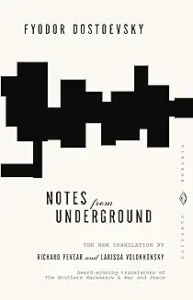Notes from Underground by Fyodor Dostoevsky 1864
Dostoyevsky’s novel of alienation and humiliation was the third assignment in James Wood’s English class on Consciousness in the Novel this semester.
The book is divided into two parts. In part one, the narrator who describes himself in the first lines of the novel as “I am a sick man….I am a wicked man” provides a stream of consciousness outpouring of his anguish. Rejecting the successful and accomplished as shallow and amoral, he both revels and anguishes in his rebellion, proclaiming that two plus two does not have to equal four. Extolling free will and rejecting the resultant choices that the masses make against their ‘profit’, the Underground Man characterizes himself as a mouse, an insect driven by self-consciousness to reject pride, happiness, security. The focus is on the psychological relationships he has with others which define him, rather than self-conscious self-definition. He is resentment personified and takes great pleasure in secret spitefulness towards those who ignore or demean him.
The second half of the book finds the underground man involved with others in three stories. First, there is the military man who ignores the underground man’s presence and renders him invisible when they walk towards each other—the underground man swerves but hates himself for doing so. In the second story, the underground man intrudes on a small dinner party given for one of his schoolmates who is going off onto a successful military career. The underground man crashes the dinner, gets drunk, challenges the others to a duel, and ends up abandoned and furious in a bordello. There, the third story unfolds as he first tries to save Liza the prostitute and then rejects her violently.
Dostoyevsky is examining the consequences of freedom (2+2=5, acting against our self-interests) and unfreedom (determinism that turns men into piano keys). Religion, especially his own Christian fanatacism, offers hope, but what if heaven itself is deterministic? What if the after-life like this one is a North Korea of the mind?
I found the first part of the book to be very heavy going and had Wood not brilliantly explained the plot, structure, and philosophy behind Dostoevsky’s writing, I probably would have abandoned the book early on. I’m glad I pressed on and finished this brilliant and pathbreaking novel written 150 years ago.



